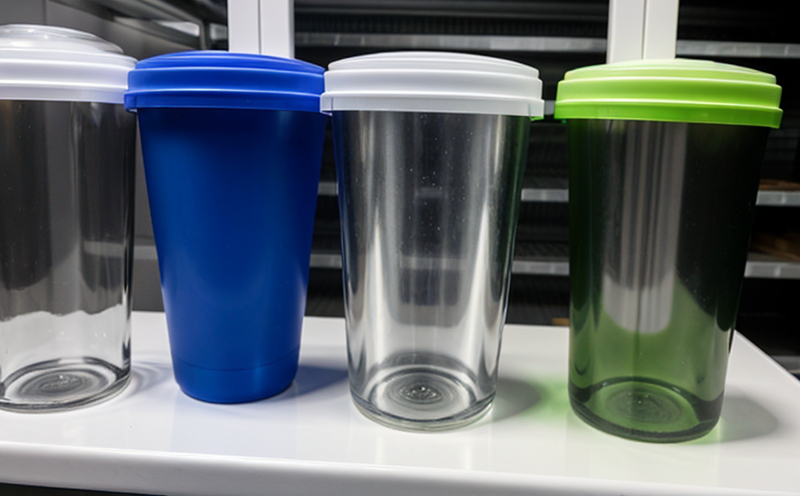ASTM C162-05 Thermal Stress Endurance
The ASTM C162-05 thermal stress endurance test is a critical procedure used to assess the resistance of glass packaging materials to thermal shock. This testing method is essential in quality assurance processes, ensuring that glass containers can withstand sudden temperature changes without cracking or breaking.
Glass packaging often undergoes significant environmental conditions during production, storage, and transportation phases. These variations in temperature—ranging from freezer-like temperatures to scorching heat—can lead to thermal stress on the material. The ASTM C162-05 test evaluates how well a glass container can endure these stresses without compromising its structural integrity.
The testing process typically involves filling pre-conditioned glass containers with a specified liquid (such as water or an equivalent) and then rapidly heating and cooling them according to set protocols. This rapid temperature cycling simulates the real-world thermal shock that packaging might encounter. The test is designed to identify potential weaknesses in design, material selection, or manufacturing processes.
The ASTM C162-05 method has been validated by numerous studies and is widely accepted as a standard for evaluating glass containers' resistance to thermal shock. Compliance with this standard ensures that products meet industry safety requirements and perform reliably under various temperature conditions.
For quality managers, compliance officers, R&D engineers, and procurement teams, understanding the nuances of ASTM C162-05 is crucial. It helps in selecting appropriate materials for new product development or ensuring existing packaging meets regulatory standards.
- Pre-conditioning: Specimens are conditioned to a specific temperature before testing begins.
- Thermal Shock Cycle: The specimen undergoes rapid heating and cooling cycles that simulate real-world conditions.
- Material Evaluation: The test assesses the material's ability to withstand thermal shock without failure.
The results of this testing provide valuable insights into the durability and reliability of glass packaging materials. Engineers can use these findings to improve designs, enhance product performance, and ensure compliance with international standards like ASTM C162-05.
By leveraging ASTM C162-05 thermal stress endurance tests, manufacturers can significantly reduce risks associated with material failure due to temperature fluctuations. This leads to enhanced product quality and customer satisfaction while maintaining regulatory compliance.
Eurolab Advantages
EuroLab is committed to providing the highest level of service in glass packaging testing, including ASTM C162-05 thermal stress endurance tests. Our team of experts ensures that every test adheres strictly to international standards and guidelines.
- Accreditation: We are fully accredited by prestigious bodies such as ISO/IEC 17025, ensuring the accuracy and reliability of our results.
- Experience: With years of experience in glass packaging testing, we have developed a deep understanding of sector-specific needs and challenges.
- Technology: Utilizing state-of-the-art equipment, we can perform ASTM C162-05 tests with precision and repeatability.
- Comprehensive Reporting: Our detailed reports provide actionable insights that help clients make informed decisions about their packaging materials.
At EuroLab, we pride ourselves on delivering exceptional service. From initial consultation to final report delivery, our goal is to exceed expectations and ensure customer satisfaction.
Quality and Reliability Assurance
- Consistent Results: Our rigorous quality control measures ensure that each ASTM C162-05 test provides consistent results across multiple trials.
- Comprehensive Data: Extensive data collection during testing allows for thorough analysis, providing a clear picture of material performance under thermal stress.
- Expert Analysis: Our team of experienced engineers and scientists interprets the data to provide valuable insights into potential improvements or issues.
The ASTM C162-05 test is just one part of our comprehensive quality assurance framework. By integrating this test with other assessments, we offer a holistic approach to ensuring product reliability and safety.
Competitive Advantage and Market Impact
By incorporating ASTM C162-05 thermal stress endurance tests into their development processes, companies can gain significant competitive advantages. These include:
- Enhanced Product Reliability: Ensuring that glass packaging materials can withstand various temperature conditions improves product durability and longevity.
- Informed Decision Making: The insights gained from these tests help businesses make informed decisions about material selection and design optimization.
- Regulatory Compliance: Meeting international standards like ASTM C162-05 demonstrates a commitment to quality, which can enhance brand reputation and customer trust.
- Cost Efficiency: Early identification of potential issues through testing helps prevent costly recalls or product failures later in the lifecycle.
In today's competitive market, these advantages translate into stronger market positions and increased customer satisfaction. Companies that prioritize ASTM C162-05 tests are better positioned to meet evolving industry demands and maintain high standards of quality.





